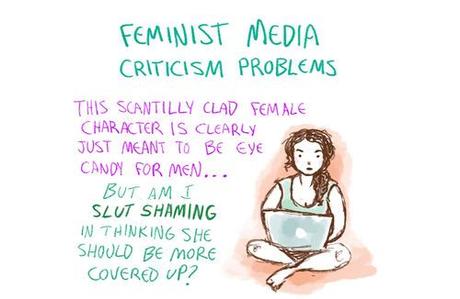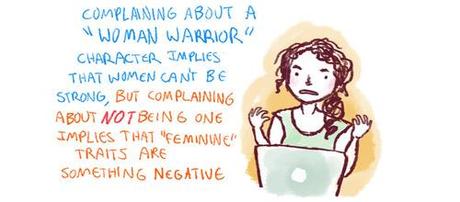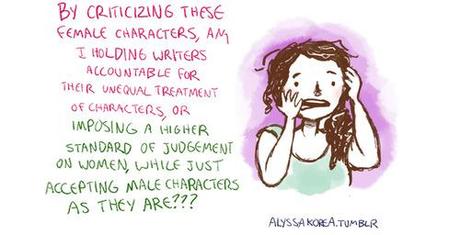I was avoiding my statistics homework today and found this comic on Tumblr, by an art student named Alyssa Korea:



This really resonated with me, for various reasons. First of all, it really captures that feeling of Am I doing it wrong am I saying something problematic am I exactly what I’m fighting against that many of us experience as a constant low hum but never talk enough about. Activism of all kinds–not just social justice–has a high barrier to entry because you sort of have to learn a certain language, to talk the talk. You also have to learn to walk the walk and exemplify the ideals you’re fighting for in your everyday life, which is why many feminist women agonize over things like wearing makeup, wanting to be pretty, getting married, and having children–they fear that it makes them “Bad Feminists.”
This is, of course, not unique to activists. Communities define themselves both proactively and also in opposition to those they seek to exclude (and seeking to exclude people isn’t necessarily a bad thing in and of itself). As the furor over “Fake Geek Girls” shows, geek/nerd/fandom communities are struggling with this too. And not just that–perhaps you have reaped the shame of being a Star Wars fan who enjoys the prequel trilogy, or a Harry Potter fan who prefers the movies to the books. (Only one of these two applies to me; I’ll let you guess which.)
But the stakes are higher with social justice. If you say the wrong thing, you risk more than just annoying people who think the prequel trilogy is totally the stupidest shit ever. You risk seriously hurting someone you’re trying to work with and exposing your own unexamined prejudice–which all of us have, believe me–to people you respect and want to gain the respect of.
It’s not just a social thing, though. We want to be right, not just for selfish egotistical reasons but also because we’re invested in the concept of being able to change things. If you’re wrong about what causes X Problem or how to fix it, then, at least in this particular instance, you’re not helping. And you really want to help. We all do.
That’s the other reason the particular sort of angst in this comic is something I can really relate to. I have a moment at least once a day when I’m like WHAT IF EVERYTHING I BELIEVE AND THINK I KNOW IS ACTUALLY WRONG. There are probably a few reasons for this: 1) impostor syndrome, 2) having always had plenty of people tell me that everything I believe and think I know is actually wrong, 3) having been raised a skeptic.
That third one is why I ultimately think that, no matter how unpleasant it is to do what the woman in the comic is doing–what I do every day–that is actually a feature, not a bug. Questioning yourself is good. It makes you better. Questioning your beliefs and opinions also doesn’t mean you have to question your worth as a person. You can be wrong about something–many things, even–and still be a decent, worthy human being.
Nonetheless, activism is contingent on getting people’s attention and making strong statements. I wish it weren’t, but it is. If I wrote a blog post like this comic, it probably wouldn’t have much of an influence because I’d sound wishy-washy and uncertain of my own positions. People wouldn’t feel compelled to think about what I wrote and to take action on it.
On the other hand, maybe it would do some good. Opinionated people are often accused of being “dogmatic” or “intolerant” of other opinions, but that’s partially because nobody hears or reads all the inner monologues and debates we have. There have been times when I’ve written entire blog posts, realized I disagreed with them, and deleted them without publishing. You’ve never read those blog posts. There are huge swaths of fascinating subjects that I’ve never written about–racial preferences in dating, whether or not religious belief is a choice, why boys are falling behind in schools, the usefulness of the DSM, whether or not we should abandon the label “feminist”–because I just haven’t made up my mind!
By the time I do write something, I’ve generally read a ton of articles about it (or even books in some cases), pushed it around in my mind like a picky eater pushes food around on a plate, discussed it with a few people, and debated myself extensively. Sure, sometimes I change my mind later, but by the time a blog post appears, hours and hours of preparation have gone into it. So you can imagine it’s a little annoying to be told that perhaps I just haven’t “considered” other opinions.
I like this method. It works for me. But I sometimes worry that if I reveal it to people, they will lose respect for me as an activist because they’ll see that I’m not always as firm in my convictions as I appear to me. I struggle with doubt. I wonder sometimes if we’re not just making mountains out of molehills or being “too sensitive.” (I wonder, of course, but you know how I really feel about that.) Maybe that’s an irrational fear. Maybe all of you feel the same way as the woman in the comic.
And that’s why I think the comic is so important, especially when it comes to feminist media criticism. People often try to play “Gotcha!” with feminists who criticize media, hoping to catch them in an act of hypocrisy. For instance, if a feminist says something like, “It’s kinda fucked up that all the female characters on this show are always dressed so revealingly,” a decidedly-not-feminist will be like “OH SO ARE YOU SAYING THAT WOMEN SHOULDN’T DRESS REVEALINGLY? HUH?”
Of course, these arguments are usually made in bad faith. I have been accused of “perpetuating patriarchy” by people who previously commented that they refuse to believe that patriarchy even exists. So when conversations like this happen, it’s generally pretty clear that the person isn’t actually super concerned with women’s right to wear as much or as little as they want; they’re just trying to force me into a corner in which I look like a hypocrite.
But this comic shows that 1) we do not have easy answers to this, and 2) criticism is a process, not a product. One doesn’t produce criticism and then go “Alright here’s my criticism! Here’s my Ultimate Answer To The Problem of Objectification of Women In The Media!” Feminist criticism is, rather, a process in which we think critically about the images and scripts with which we are constantly presented, picking them apart and figuring out why they’re so common and compelling, trying to design slightly better (but still wildly imperfect) ones instead.
And that, really, is what all activism is.
